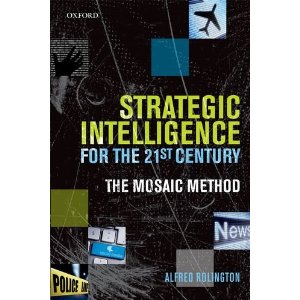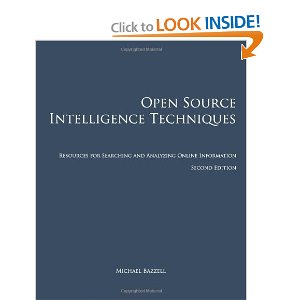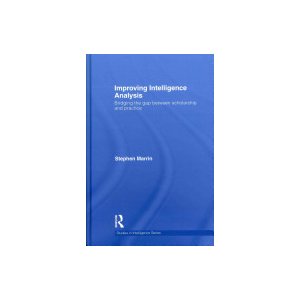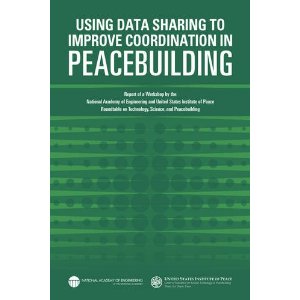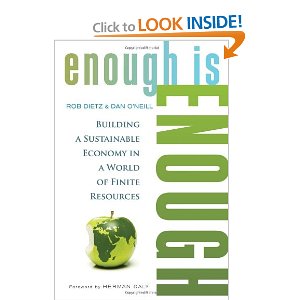
Rob Dietz and Dan O'Neill
5.0 out of 5 stars Important Milestone, Two Gaps, February 4, 2013
I was educated in the Limits to Growth period–back in the day of telephone couplers–and have also been an ardent follower of Herman Daly's pioneering work in ecological economics as well as complementary work spanning the last several decades, notably by Paul Hawkins among others.
On the one hand this book is very important and not to be ignored, not least because the foreword is written by Herman Daly and there are pages of glowing endorsement from serious people. The book is superbly organized and below I do my summary, as much for my own future recall as for others. First however, two gaps:
01 This book shares one troubling assumption with Limits to Growth — they thought they could micro-manage from the top down and that governments would be the principal actors. The Club of Rome, in choosing to support the Meadows and Randers, explicitly rejected the more affordable and implementable alternative that focused on educating the public with respect to true costs and creating a culture of bottom up conservation instead of a bureaucracy of top-down regulation.
02 The book is perfection incarnate with respect to being the best summary I have seen yet of what are we doing now and what should we be doing, but it skips over the hard part: how to we establish a universal appreciation for whole systems thinking, respect for feedback loops, and acute public awareness of the true cost of every product, service, and behavior? The concept of a steady-state economy is a useful one, but only if one appreciates, as Charles Perrow is at pains to document, that we are our own worst enemies, creating catastrophe at every turn, because we know not what we do or what is done in our name, and allow the hoarding of profit and the externalization of costs to future generations.
Implicit in both of the above, and explicitly not addressed in the book, is the reality that all organizations — be they government or private sector and including non-profit — are corrupt to the bone. Their leaders are focused on what benefits the leaders, not the ctizens, tax-payers, stake-holders, etcetera. I certainly agree with Lawrence Lessig that “the” fatal threat to humanity is CORRUPTION, and I have set for myself the task of further PUBLIC INTELLIGENCE IN THE PUBLIC INTEREST.
I particularly reject the carbon tax, mercury and sulfer are much more dangerous, and the last thing we need is another derivatives scheme. Please note that my praise for the book is denoted by the five star ranking and my strong recommendation that it be bought, read, and shared. By virtue of my need to also focus on what is not in the book, my critical comments may seem inconsistent with the grade but they are not — they augment this excellent work rather than diminish it.
Now to the details.
High-level objectives:
+ New measures and meanings of progress
+ Limits on material and energy consumption, waste production, plus conservation of natural lands
+ A staple population and labor force
+ A more efficient capital stock
+ More durable, repairable products
+ Better pricing including a carbon tax [NO — just make TRUE COST pricing available at point of sale]
+ Shorter work week and more leisure time
+ Reduced inequality
+ Fewer status goods
+ More informative and less deceptive advertising [NO — END all advertising]
+ Better screening of technology [NO — UNLEASH all technologies now locked up for the wrong reasons]
+ More local and less global trade of goods and services [YES — resilience at the local level]
+ Education for life, not just for work [YES, free for life as well]
The authors then go on to discuss eleven things we have too much of, and how to reduce them:
01 Throughput [use only what will renew, create no waste that will not recycle]
02 People [educate the women, make population limitation a national cultural priority]
03 Inequality [set maximum pay differentials, employee owned companies]
04 Debt [end national debt, local currencies, restructure financial institutions]
05 Miscalculation [Human Well-Being as Measure]
06 Unemployment [Full employment policies]
07 Business as Usual [Limit size of corporations]
08 Materialism [Eliminate planned obsolescence, culture of humanity instead of things]
09 Silence [Strengthen academic multi-disciplinary steady-state voice]
10 Unilateralism [Stop being the bully — multinational consensus]
11 Waiting [sustainable scale, fair distribution, efficient allocation, high quality of life]
There are many excellent notes but no bibliography, and the index is a bit light.
The authors take a stab at a “whole system” conclusion, with the following each discussed in a paragraph:
01 Consumption
02 Population
03 Families
04 Community
05 Business
06 Cities
07 Agriculture
08 Nature
09 Energy
10 Money
This is where I identify a third gap in the book. The concept of “free energy” is not in this book, and it should be. Apart from exposing and eradicating corruption in all its forms — in the USA it is corruption, nothing more, that causes the US Government to borrow one trillion dollars a year and waste 50% of three trillion dollars a year each year — we should be doing a global Manhattan Project to create free energy, which in turn creates unlimited clean water. Throw in national call centers, an Autonomous Internet with Freedom Towers everywhere and free cell phones for life for the five billion poor, and you create a prosperous world at peace, a world that works for all.
Below are ten books that complement this one.
High Noon 20 Global Problems, 20 Years to Solve Them
A More Secure World: Our Shared Responsibility–Report of the Secretary-General's High-level Panel on Threats, Challenges and Change
Philosophy and the Social Problem: The Annotated Edition
The Lessons of History
Shoveling Fuel for a Runaway Train: Errant Economists, Shameful Spenders, and a Plan to Stop them All
Valuing the Earth: Economics, Ecology, Ethics
The Future of Life
Designing a World That Works for All: How the Youth of the World are Creating Real-World Solutions for the UN Millenium Development Goals and Beyond
Blessed Unrest
Empowering Public Wisdom: A Practical Vision of Citizen-Led Politics (Manifesto Series)
Governments have failed and are not the answer. There are eight “tribes” of knowledge: academic, civil society, commerce, government, law enforcement, media, military, and non-government/non-profit. We are at the very beginning of an era of hybrid governance that must be enabled by open-source decision-support. That is the center of gravity for creating a prosperous world at peace, a world that works for all, and that is not something the ecological economists have grasped just yet.
Best wishes to all,
Robert David STEELE Vivas
INTELLIGENCE for EARTH: Clarity, Diversity, Integrity, & Sustainability


